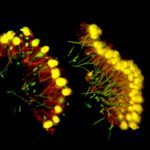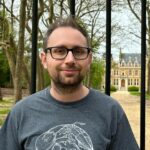Lien vers Pubmed [PMID] – 37067637
Lien vers HAL – pasteur-04087787
Lien DOI – 10.1007/s10071-023-01776-z
Anim Cogn 2023 Nov; 26(6): 1767-1782
All animals evolved from a single lineage of unicellular precursors more than 600 million years ago. Thus, the biological and genetic foundations for animal sensation, cognition and behavior must necessarily have arisen by modifications of pre-existing features in their unicellular ancestors. Given that the single-celled ancestors of the animal kingdom are extinct, the only way to reconstruct how these features evolved is by comparing the biology and genomic content of extant animals to their closest living relatives. Here, we reconstruct the Umwelt (the subjective, perceptive world) inhabited by choanoflagellates, a group of unicellular (or facultatively multicellular) aquatic microeukaryotes that are the closest living relatives of animals. Although behavioral research on choanoflagellates remains patchy, existing evidence shows that they are capable of chemosensation, photosensation and mechanosensation. These processes often involve specialized sensorimotor cellular appendages (cilia, microvilli, and/or filopodia) that resemble those that underlie perception in most animal sensory cells. Furthermore, comparative genomics predicts an extensive “sensory molecular toolkit” in choanoflagellates, which both provides a potential basis for known behaviors and suggests the existence of a largely undescribed behavioral complexity that presents exciting avenues for future research. Finally, we discuss how facultative multicellularity in choanoflagellates might help us understand how evolution displaced the locus of decision-making from a single cell to a collective, and how a new space of behavioral complexity might have become accessible in the process.

